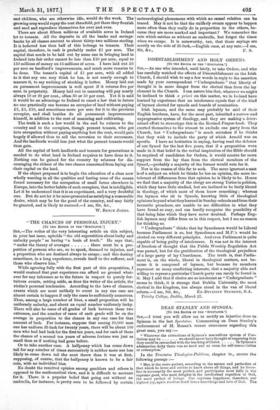DISESTABLISHMENT AND HOLY ORDERS.
[TO THE EDITOR OF THE " SPECTATOR."] SIR,—As one who intended, until lately, to take Orders, and who has carefully watched the effects of Disestablishment on the Irish Church, I should wish to say a few words in reply to the assertion made by your correspondent " Undergraduate " that liberty of thought is in more danger from the clerical than from the lay element in the Church. I can assure him that, whatever we might be inclined to think a priori on this matter, we in Ireland have learned by experience that no intolerance equals that of the kind of laymen elected for synods and boards of nomination.
Irish laymen, and the same may probably be said of their English brethren, have, for the most part, inherited a narrow and unprogressive system of theology, and they are making a deter- mined effort to stereotype this in the Revised Prayer-book. They exerted themselves to the utmost to exclude one party from the Church, but " Undergraduate " is much mistaken if he thinks that they wish to include the party of which Arnold was an apostle. I have no hesitation in saying, having read the debates of our Synod for the last five years, that if a proposition were made in it that belief in the verbal inspiration of the Bible should be required of candidates for Orders, it would receive far more support from the lay than from the clerical members of the Synod,—probably a majority of the former would vote for it.
Nor is the reason of this far to seek. The more ignorant a man is of a subject on which he'thinks he has an opinion, the more in- tolerant of differences from that opinion he is likely to be. Hence we find that a majority of the clergy are strong Tories in politics, which they have little studied, but are inclined to be fairly liberal in theology, of which most of them know something ; whereas the laymen who sit in Synods, knowing little of theological opinions beyond what theylearned in Sunday-schools and from their favourite preachers, are unable to see difficulties in what they have found so easy, and can hardly recognise the possibility of that being false which they have never doubted. Perhaps Eng- lish laymen may differ from us in this respect, but I see no reason for thinking so.
" Undergraduate" thinks that lay Synodsmen would be Liberal because Parliament is so, but Synodsmen and M.P.'s would be elected on very different principles. And even Parliament is quite capable of being guilty of intolerance. It was not in the interest of freedom of thought that the Public Worship Regulation Act was passed, but for the gratification of the theological prejudices of a large party of lay Churchmen. The truth is, that Parlia- ment is, on the whole, liberal in theological matters, not be- cause it is composed of laymen, but because its members represent so many conflicting interests, that a majority able and willing to repress a particular Church party can rarely be found in it. May I add that if clerics are so intolerant as " Undergraduate " seems to think, it is strange that Dublin University, the most clerical in the kingdom, has always stood in the van of liberal


































 Previous page
Previous page